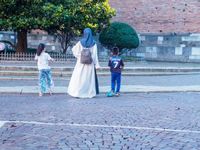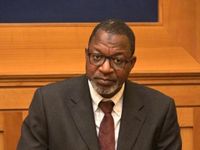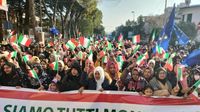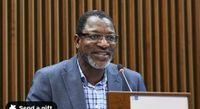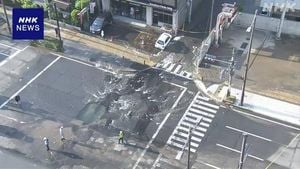In a historic turn of events for Italian politics, the municipal elections in Monfalcone, Gorizia, held on April 15, 2025, saw the debut of an Islamic political list called Italia Plurale. This unprecedented move showcases the growing political engagement of immigrant communities in Italy, particularly in a town that has become a microcosm of the challenges and opportunities associated with multiculturalism and integration.
Italia Plurale is led by Bou Konate, a Senegalese-born engineer and former city councillor, who previously served as the councilor for public works in 2001. The list, which consists of 18 candidates, has the potential to draw support from approximately 7,982 voters, primarily immigrants from Bangladesh and other Southeast Asian countries working at the local Fincantieri shipyard, one of the largest industrial hubs in the region.
Monfalcone is notable for its demographic makeup, with nearly one-third of its 30,000 inhabitants being foreign-born. The town has attracted labor from various regions, including Bangladesh, the Balkans, and Eastern Europe, creating a diverse community that has long been underrepresented in local politics. Konate and his fellow candidates argue that their participation in the elections is not about forming a religious or ethnic bloc but rather about civic engagement and representation. "We are Italians, and we want to be represented," Konate stated, emphasizing the importance of inclusion.
The emergence of Italia Plurale comes in response to what many in the immigrant community perceive as exclusionary policies from local authorities. The previous mayor, Anna Maria Cisint, from the right-wing League party, implemented several controversial measures, including closing abusive mosques, banning women from bathing dressed, and prohibiting Bangladeshis from playing cricket in municipal gardens. Such actions have been described as part of a broader "policy of hate" that has galvanized the immigrant community to seek political representation.
Jahirul Islam, the capolista (lead candidate) for Italia Plurale, remarked, "We run to win, but in any case, it will be a success. We managed to gather signatures and create a list. Before, we never even considered it. It was the politics of hate against us that united us. I am sure Monfalcone will be an example for immigrants in other cities, and Italia Plurale will become a symbol." This sentiment reflects a growing confidence among immigrant communities who wish to assert their rights and influence local governance.
The political landscape in Monfalcone is not without its tensions. The presence of Italia Plurale has sparked controversy, with former mayor Cisint accusing the group of attempting to establish an "Islamic enclave" and criticizing left-wing politicians for what she views as a threat to Italian identity and values. This has led to a national debate over multiculturalism and integration, with even members of the center-left Democratic Party expressing concerns about the list's ethnic focus.
On election day, tensions escalated when a Muslim woman wearing a niqab was initially barred from entering a polling station due to regulations requiring visible identification. This incident highlighted the ongoing cultural and legal frictions surrounding religious practices in public spaces in Italy, further complicating the already contentious atmosphere surrounding the elections.
Despite the challenges, the emergence of Italia Plurale marks a significant moment in Italian political life. While the list is unlikely to secure a majority, its existence represents a shift towards greater political ambition among communities that have historically remained on the margins. The situation in Monfalcone could set a precedent for other towns across Italy grappling with similar demographic transformations, as the nation continues to confront the realities of immigration, identity, and representation.
As the vote counting continues, many are watching closely to see how this new political force will shape the future of Monfalcone and beyond. The implications of these elections extend far beyond local governance; they resonate with a broader narrative about the evolving nature of Italian society and the increasing call for inclusivity in its political landscape.
In conclusion, Italia Plurale's participation in the Monfalcone municipal elections is a landmark event that underscores the shifting dynamics of political representation in Italy. As immigrant communities assert their presence and demand a voice in governance, the outcomes of these elections could herald a new chapter in the country's approach to diversity and inclusion.
